It doesn’t take too long binging on the tv show Lost to realize the passengers of Oceanic Flight 815 are as metaphorically lost as they are physically. A grieving alcoholic brain surgeon with a God complex. A former member of the Iraqi Republican guard who specializes in torture. A morbidly obese mental patient. An accused murderess. 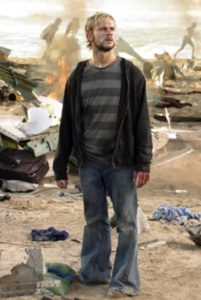 Lost creator J.J. Abrams’s ability to lead his audience to root for and even identify with such normally unrelatable characters is part of Lost’s extraordinary appeal; the show averaged 11 to 16 million viewers per episode during its 6 season run. Yet there was one Lost character I related to all too well: heroin addict Charlie Pace, played by Dominic Monaghan.
Lost creator J.J. Abrams’s ability to lead his audience to root for and even identify with such normally unrelatable characters is part of Lost’s extraordinary appeal; the show averaged 11 to 16 million viewers per episode during its 6 season run. Yet there was one Lost character I related to all too well: heroin addict Charlie Pace, played by Dominic Monaghan.
When we first encounter Charlie, he’s wandering around the wreckage of flight 815 in a daze. Soon into the pilot, we learn his daze is induced not by the shock of surviving a plane crash but because of the heroin he’d snorted in the plane’s lavatory moments before it broke apart mid-air. During early sobriety from cocaine and alcohol, I often wished I could retreat to a deserted island, far from my old playgrounds, playthings, and playmates. Yet, as Charlie finds, change in geography doesn’t cure addiction. Charlie’s journey through relapse, recovery, and redemption is a road many addicts have undertaken in our quest for healing and wholeness. As J.R.R. Tolkien muses in The Fellowship of the Ring, “not all those who wander are lost.”
Tabula Rasa
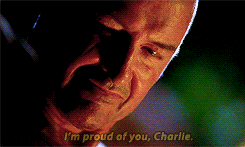 Early into the series, mysterious “man of faith” John Locke befriends and mentors Charlie. Many characters on the island are named after philosophers and theologians; 17th century enlightenment thinker John Locke is best known for modernizing Aristotle’s “tabula rasa” or “self as a blank slate” philosophy. Two decades into sobriety, I understand that the right mentor (“sponsor,” in Alcoholics Anonymous lingo) is critical to recovery from addiction. John takes Charlie under his care, assuring him that the island is Charlie’s chance to make a clean break from his past.
Early into the series, mysterious “man of faith” John Locke befriends and mentors Charlie. Many characters on the island are named after philosophers and theologians; 17th century enlightenment thinker John Locke is best known for modernizing Aristotle’s “tabula rasa” or “self as a blank slate” philosophy. Two decades into sobriety, I understand that the right mentor (“sponsor,” in Alcoholics Anonymous lingo) is critical to recovery from addiction. John takes Charlie under his care, assuring him that the island is Charlie’s chance to make a clean break from his past.
“It doesn’t matter…who we were before this, what we did before the crash. Three days ago, we all died. We all should be able to start over.”
—Jack, Lost, Season 1, Episode 3: “Tabula Rasa”
Why does John make such an excellent sponsor?
He doesn’t sugarcoat
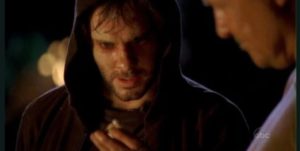 One of the biggest misconceptions addicts and those who love them make is to assume life will be easy after getting clean from drugs and alcohol. Using the analogy of a moth breaking free from its chrysalis, John shows Charlie that the struggle to break free from heroin addiction gives him the strength he needs to live a sober life. It isn’t always easy. After my best friend’s murder, the thing that kept me from hitting the bars or calling a contact was all of the hard work I’d done to get and maintain sobriety. Is my life easier now? In many ways, yes. As the 9th step promises state on pages 83 and 84 of The Big Book of Alcoholics Anonymous, sobriety teaches us to “intuitively know how to handle situations that used to baffle us,” but only after realizing “God is doing for us what we cannot do for ourselves.”
One of the biggest misconceptions addicts and those who love them make is to assume life will be easy after getting clean from drugs and alcohol. Using the analogy of a moth breaking free from its chrysalis, John shows Charlie that the struggle to break free from heroin addiction gives him the strength he needs to live a sober life. It isn’t always easy. After my best friend’s murder, the thing that kept me from hitting the bars or calling a contact was all of the hard work I’d done to get and maintain sobriety. Is my life easier now? In many ways, yes. As the 9th step promises state on pages 83 and 84 of The Big Book of Alcoholics Anonymous, sobriety teaches us to “intuitively know how to handle situations that used to baffle us,” but only after realizing “God is doing for us what we cannot do for ourselves.”
He focuses on Charlie’s strengths
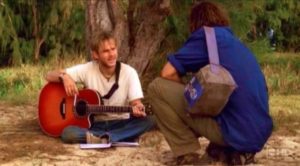 By trading Charlie’s stash of heroin for his beloved guitar, John reminds Charlie that his addiction doesn’t define him. My first sponsor encouraged me to “balance my inventory,” or make a list not only of the things I wanted to change, but the things I like about myself. At first, that was difficult. I didn’t like myself very much after I soberly looked at the people I’d used and hurt while trying to get my next fix. But I eventually came to appreciate the gifts that God has given me, and I’m continually learning to like and love the woman he made me to be.
By trading Charlie’s stash of heroin for his beloved guitar, John reminds Charlie that his addiction doesn’t define him. My first sponsor encouraged me to “balance my inventory,” or make a list not only of the things I wanted to change, but the things I like about myself. At first, that was difficult. I didn’t like myself very much after I soberly looked at the people I’d used and hurt while trying to get my next fix. But I eventually came to appreciate the gifts that God has given me, and I’m continually learning to like and love the woman he made me to be.
He knows the danger of resentments
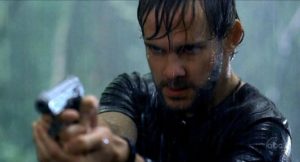 When Charlie attempts to get even with an enemy, John assures him that revenge will take its toll on him. Indeed, his act of hatred leads to a near relapse and the loss of the woman he loves. Thankfully, with the help of healthy companions, Charlie is able to make missteps without losing everything. Alcoholics Anonymous has many catchphrases; one of my favorites is “Progress over Perfection.” As my first sponsor taught me, failure is not the opposite of success. The opposite of success is giving up.
When Charlie attempts to get even with an enemy, John assures him that revenge will take its toll on him. Indeed, his act of hatred leads to a near relapse and the loss of the woman he loves. Thankfully, with the help of healthy companions, Charlie is able to make missteps without losing everything. Alcoholics Anonymous has many catchphrases; one of my favorites is “Progress over Perfection.” As my first sponsor taught me, failure is not the opposite of success. The opposite of success is giving up.
John encourages Charlie to help
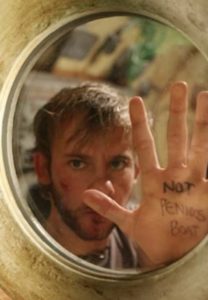 One of the keys to recovery is getting outside ourselves by helping others. When a friend is buried in a cave collapse, John encourages Charlie to assist in the rescue effort. I tell the women I’m mentoring how valuable they are to my recovery; Charlie’s part in the cave rescue solidifies his decision to quit heroin for good. In fact, it is the first of many heroic acts that transform Charlie into one of the island’s heroes.
One of the keys to recovery is getting outside ourselves by helping others. When a friend is buried in a cave collapse, John encourages Charlie to assist in the rescue effort. I tell the women I’m mentoring how valuable they are to my recovery; Charlie’s part in the cave rescue solidifies his decision to quit heroin for good. In fact, it is the first of many heroic acts that transform Charlie into one of the island’s heroes.
Like myself, like the other memorable Lost characters, Charlie’s is a story of “once lost, now found;” the redeemed, not the marooned.
